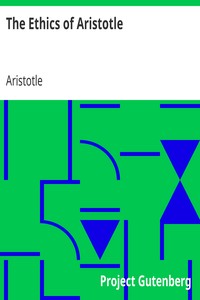| Author |
Aristotle, 385 BCE-323 BCE |
| Title |
The Ethics of Aristotle
|
| Note |
Reading ease score: 48.1 (College-level). Difficult to read.
|
| Note |
Wikipedia page about this book: https://en.wikipedia.org/wiki/Golden_mean_(philosophy)
|
| Credits |
Ted Garvin, David Widger and the DP Team
|
| Summary |
"The Ethics of Aristotle" by Aristotle is a foundational philosophical treatise written in the 4th century BC. This work serves as a comprehensive exploration of moral philosophy, addressing the nature of good character, virtue, and ultimately happiness, which Aristotle identifies as the chief aim of human action. The text is a part of Aristotle's broader discussions on human conduct, linked with his other work, "Politics," to form a holistic view of moral and civic life. The opening of this significant text introduces the central themes of ethics as they pertain to individual behavior in a societal context. Aristotle posits that every action is directed towards some good, with happiness defined as the ultimate end that people seek. Through a thorough analysis of various modes of life, including the pursuit of pleasure, honor, and contemplation, Aristotle thoughtfully critiques popular notions of happiness. He emphasizes the importance of virtue, which is achieved through habituation and reasoned action, ultimately weaving together ethics with the practical aspects of living well and functioning within the community. The excerpt illustrates Aristotle's method of philosophical inquiry, laying a groundwork for his extensive examination of moral virtues and their application in life. (This is an automatically generated summary.)
|
| Language |
English |
| LoC Class |
B: Philosophy, Psychology, Religion
|
| LoC Class |
PA: Language and Literatures: Classical Languages and Literature
|
| Subject |
Ethics
|
| Category |
Text |
| EBook-No. |
8438 |
| Release Date |
Jul 1, 2005 |
| Most Recently Updated |
Aug 1, 2021 |
| Copyright Status |
Public domain in the USA. |
| Downloads |
8833 downloads in the last 30 days. |
|
Project Gutenberg eBooks are always free!
|

